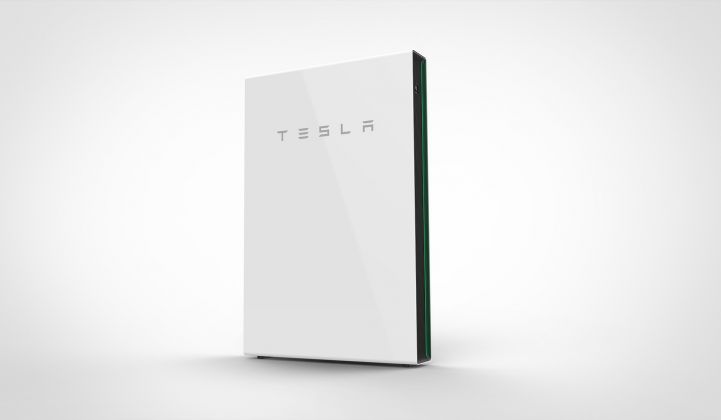Tesla now charges more for its Powerwall than it did back when the product launched in October 2016.
The company's website now lists the starting price for the 7-kilowatt/13.5-kilowatt-hour storage system as $5,900 — a $400 increase from the original list price of $5,500. The actual price to a customer will be higher still, because it includes supporting hardware, installation and other fees.
The $5,900 rate applies to new orders; orders placed before February 22 will have the previous pricing, a Tesla spokesperson clarified by email Thursday.
"Tesla evaluates its global pricing of energy products based on various factors and continues to make improvements that will simplify homeowner experience," the spokesperson noted. "Powerwall continues to provide great value for customers and installers."
Conventional wisdom in the industry has held that energy storage prices will fall as battery manufacturing scales up. Indeed, the Powerwall 2 debuted at a price point 40 percent cheaper than its predecessor, based on energy capacity.
Since the Powerwall 2 launch, Tesla has had a year and a half to increase its manufacturing capabilities. Battery prices have fallen by double-digit percentages annually. Analysts suggest future demand for electric vehicles could create scarcity for battery materials like cobalt, counteracting battery price declines, but that's still a ways off.
The Powerwall price hike, then, cuts against the grain of broader energy storage industry trends.
This is not the first time that Tesla has revised its battery offerings without fanfare.
Greentech Media reported in March 2016 that Tesla had quietly discontinued its longer-duration Powerwall model, which was intended to target customers looking for backup power. The company said at the time that it had decided to focus exclusively on its shorter-duration product for daily cycling. It scrubbed the backup model from its online presence.
Even Tesla's competitors concede that the company catalyzed public awareness of what energy storage can do. It also cemented a reputation for the lowest home battery pricing, leveraging the in-house supply chain built for its electric vehicle business to offer price points that make competing products look like luxury items.
It's not clear which "various factors" drove the decision to charge more.
The actual cost to build a storage product remains a jealously guarded secret. It's possible that Tesla chose to prioritize market share initially with a low price, and bank on increasing margins when its production costs came down. In that scenario, the choice to raise the list price could reflect an adjustment of the relationship between the cost to build a Powerwall and its end price.
Or the company might just need more cash.
Production of the Model 3 sedan has lagged behind targets due to manufacturing bottlenecks. The pressure from the automotive business might be rippling out to other sectors of the company. The solar business already underwent a cost-cutting process, by stopping door-to-door sales and prioritizing more profitable deals.
That said, the company's home battery sales nearly vanish when compared to its automotive revenue.
Whatever the reasons, the change counters the optimistic view that the only direction storage product prices can go is down.




